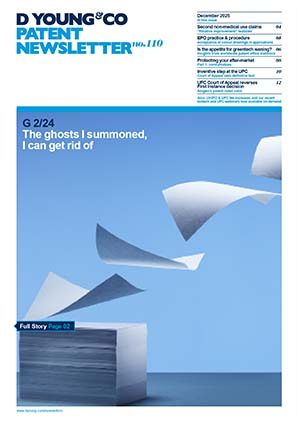Renewal reminders - obligations on applicants
This European appeal concerns obligations on applicants regarding renewal reminders from an agent such as an IP firm.
Two reminders were sent to the applicant’s executive (Mr Taylor – Head of Science) prior to a renewal fee becoming due. Two further reminders were sent after this date, within the six month grace period.
The renewal fees remained unpaid and consequently a loss of rights was received by the agent.
Each of the reminders was sent by post and marked as being of particular urgency (“renewal notice”, “final renewal notice”, “important – overdue renewal fees”).
The applicant made a request for re-establishment stating that during the period in question, Mr Taylor had been required to cover the vacant role of Technical Manager, and this necessitated a great deal of travel. During this period, the reminders from the agent had been received and placed in a “junk” pile for Mr Taylor to check. However, this never happened.
The request for re-establishment was refused and the applicant appealed.
The Board of Appeal noted that the requirement to take “all due care” lies first and foremost with the applicant. If the applicant appoints an agent, this duty extends to the agents, but it does not replace the applicant’ duty of care, which remains.
The Board of Appeal noted that the agent did appear to have taken all due care by having sent a number of reminders (appropriately marked as urgent).
The Board of Appeal also felt that in this particular situation, there was nothing to require the agent in the absence of instructions to pay for the renewal fees out of their own pocket to keep the application alive.
Meanwhile, the Board of Appeal stated that the applicant had not shown a duty of care since no precautionary measures were taken to prevent a prolonged interruption in communication. Mail had been checked by an “unknown person” indicating that no instructions had been given at all. Furthermore, in the space of nine months, despite Mr Taylor being in the office at various points, the “junk” pile was never checked.
The Board of Appeal noted the case law relating to the excusable isolated mistake in an otherwise satisfactory system (J5/80). However, they noted that this related to an assistant in the role of agent. It therefore did not extend to an applicant and did not extent to a non-assistant (following R18/13). The Board of Appeal noted that Mr Taylor could not be considered to be an assistant in any event, because an assistant performs routine tasks and in Mr Taylor’s case, no supervision occurred.
In summary, it is important for applicants to remember that the EPO places obligations on the agent and the applicant to have a duty of care towards their applications.
Although a good agent will be able to anticipate deadlines and warn applicants in good time of such deadlines, agents may be unable to act without explicit instructions from the applicant.
It is therefore essential that applicants keep lines of communication open and take specific measures to prevent interruptions in communication with their agents.


